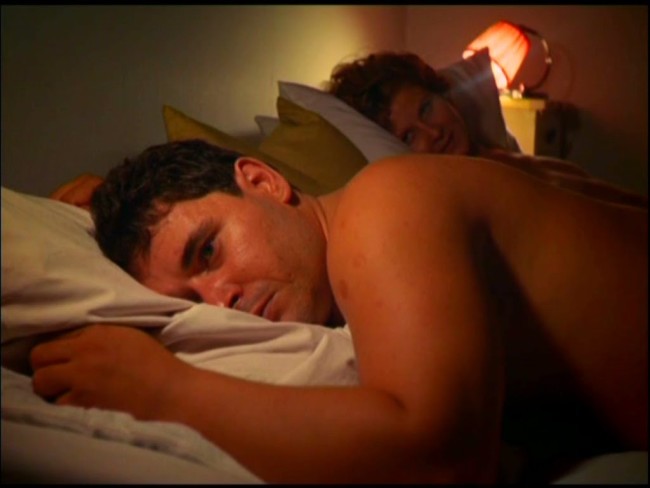One of his early works (1971), German filmmaker Rainer Werner Fassbinder both wrote and directed The Merchant of Four Seasons. Perhaps a summary should lie here. But let’s silence convention and posit a warning to viewers in its lieu: this film is perplexing. No meaty academic sentence could appropriately convey its complexities. Terse or not, it cannot be captured entirely. This film finds itself in the crossroads of grim humor and beautiful sorrow. These contrasting qualities are so alike in their dissimilarities, they are hard to distinguish.
Hans, the protagonist, is the butt of every joke. His family superciliously scrutinizes him, save one sister—one sister who retorts that their condemnations are irony’s playmates. His wife callously manipulates him. She forbids him from his true love while pursuing her own shallow love interests; she, too, manipulates them. Hans failed as a soldier and a policeman, finding himself in the present as a fruit vendor (more fodder for his family’s contempt).

“In his comic self-destruction, one cannot help but sympathize with him.”
Is he merely the butt of a joke to the viewers? In his comic self-destruction, one cannot help but sympathize with him. In one of the final scenes, he reclines defeated in a chair as a record plays. It chimes, “Your longing cannot be stilled / Even when your dreams…” Before the record can continue, Hans curses fate with a bold act of defiance as he shatters it upon his knee. If longings cannot be stilled, Hans is sure they can be silenced; he dies defending this principle as he literally drinks himself to death later in the film.
To further the film’s contradictions, tense moments of the film are met with the absence or abundance of emotions. The characters either felt, though almost always with somber seriousness, too little affected or too dramatically expressed; the shrieked shrills when Hans contritely confronts his wife in her retreat to his mother’s house subsequent to him beating her; the mechanical slaps Hans delivers to his wife prior. This adds to the humor in its guise of melodrama. Whether deadpan displays or exaggerated emotions are the indicator, both serve to underline the satirical tone of this work.
One of the difficulties of this film in an initial viewing is determining when it is being earnest or distorted. I laughed (figuratively, for nothing is literally laughable in this film) at the over-the-top moments that seemed too contrived to be real and cried (figuratively, for I am a man and I do not cry) at those same events resulting in a resounding moment that was, that is all too real. But neither tones are exclusively mutual or muted, and this makes the film rich with complex characters and situations.
Perhaps the only reliable character in the entire film is the aforementioned sister. Her words are sincere, mocking the backhandedness of her family. Iterating her brother-in-law’s words lined with double-meaning, she probes him to say what he truly means as she prompts viewers to discern what truth is veiled behind the curtains of irony. Her character is full of emotion. Honest emotion. She is likely the voice of Fassbinder himself. Her sympathies for her brother make it plain that Hans is not merely a caricature. Society is his antagonist, and a victorious one. At least he is treated kinder in the film.
The narration of this film is masterful. It weaves Hans’ story together so seamlessly it feigns chronology. However, Fassbinder utilizes flashbacks to develop Hans’ character. It is not one brunt moment of revelation, but a number of revisits to the past that help explain Hans’ present. At times, certain scenes may seem arbitrary and without significance. It is Fassbinder’s ability to address their meaning later that allows his narrative to seem natural and fluid.
What is less so is the cinematography. Fassbinder meddles with convention, namely the reaction shot. As is, the overuse of that particular technique does little to emphasize the drama and makes it seem ungainly. At best, it gives viewers a chance to consider the truth behind the curtains. At worst, it awkwardly obtrudes the viewers experience. Although, it does stylistically distinguish the film to give it a visage and personality that is familiar.
All things considered, this film is absolutely important and deserving of its ranks amongst other Criterion titles. It shows that satire is more than the slapstick shock value of shows like Family Guy and South Park. In its treatment of fidelity, class issues (the reason Hans is unable to marry his true love), skewed values, family relationships, and the rest of the contorted social paradigm represented, this film allows its viewers to be moved—even in its derision. If one finds no humor in the film’s ridicule, they are forgiven. If one find’s no pain in it, they are condemned. In one last comment on the film’s conflicting nature, I present a novel application of Whitman: “Do I contradict myself? / Very well then I contradict myself; / (I am large, I contain multitudes.)”
